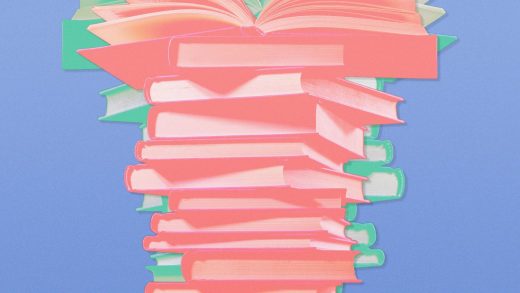What happened when I (tried to) read 30 books in 30 days
This is embarrassing to admit, but I was a writer who didn’t read much. I’d spend my days with words, and my evenings with my family, friends, and often the television (even after giving it up for a month and enjoying the experience.) It’s not for lack of ready material; I had a stack of interesting titles waiting to be read. But I didn’t.
As a kid, I was a voracious reader. The library was my favorite place, and I always had my nose buried in a book, especially the Nancy Drew series. Eventually college, career, and kids came along, and reading was moved to the back burner. If I did pick up a book, it was usually a mystery or nonfiction title on productivity, and it would take me weeks to complete it.
I thought I didn’t have time to read, but I know (having read Laura Vanderkam’s book 168 Hours: You Have More Time Than You Think) that’s not true. The “don’t have time” excuse really means “it’s not a priority.” If that doesn’t feel good, then do something about it, she advises.
So I did. I set a goal to read 30 books in 30 days. Sounds impressive, but I failed. I read 12 books, which falls far short, but that number is more than the total of books I read in all of 2017 and 2016, and maybe even 2015, too.
While I didn’t hit my goal, I should be proud of my accomplishment, says Neil Pasricha, author of The Happiness Equation: Want Nothing + Do Anything = Have Everything. “Twelve books [in a month] is 144 books a year, 25 times the average person,” he says.
Pasricha is passionate about reading. In April, he launched the podcast, 3 Books with Neil Pasricha, to encourage people to do it more often. On each episode, he speaks to inspiring individuals, such as Gretchen Rubin, Seth Godin, and Judy Blume, and asks them to share their three most formative books.
“Books are the best representative of condensed knowledge in the world,” he says. “Books take away outside voices, like a filmmaker or art director. It’s our own voice in our own head. Reading helps you learn deeper in a more intimate way.”
Twenty-seven percent of Americans haven’t read a single book in the last 12 months, according to Pew Research. One barrier is that there are just too many, says Pasricha. “Over 1,000 new books are published every day,” he says. “You have no chance of finding the ones that will actually shape your values the way you know a book can, so you grab whatever’s in a big pile at the airport and chalk up your lack of interest in it to you.”
I solved that dilemma by starting with the books I had been accumulating for months. Some of the titles included How to Be a Better Person by Kate Hanley, Entrepreneurial You by Dorie Clark, and Get Off Your Acid by Dr. Daryl Gioffre. Then I started rereading books I’ve owned for a while that are favorites, like No Impact Man by Colin Beavan and Detroitland by my first editor and writing mentor Richard Bak. I even read a favorite book I’ve had since childhood, The Boxcar Children. Reading it as an adult made me realize I’ve been a minimalist since I was young. There was no clutter in that tiny boxcar, and every item had a purpose.
What I learned
At the end of my monthlong experiment, I decided that setting a goal of 30 books in 30 days was too aggressive and probably not the best way to rekindle a reading habit. I was focused on quantity over quality, and found myself skimming to keep up the pace. That’s not a great way to get much value out of reading.
About two weeks in, I realized I wasn’t going to hit my goal, so I slowed down and enjoyed the process. Ironically, the last book I read was Vanderkam’s latest, Off the Clock: Feel Less Busy While Getting More Done. In it she writes this: “Immediate effortless pleasure wins out over the more effortful variety. Writes philosopher Robert Grudin in Time and the Art of Living, ‘We pamper the present like a spoiled child.’ We indulge its whim to scroll through Facebook posts from people we never liked in high school anyway. Then this time is nothing. It disappears as if it doesn’t exist.”
Unlike turning on the TV, reading takes effort. But that work pays dividends. Not only did I acquire new knowledge (like the impact acidic foods have in my diet), I became more present. I tend to want to get things done quickly (I write about productivity, after all.) But reading is a journey where you must be immersed in the moment.
I noticed that I was more patient with my work, not hurriedly trying to check off an item on my to-do list. And I was more present with my family. I have a habit of living in the future, thinking about what has to happen next. I started to settle into the here and now, not worrying how long a conversation or task took. It’s the attitude, “I have all the time in the world,” that Vanderkam writes about in Off the Clock.
And reading helped me improve my writing. Detroitland’s Bak is an amazing storyteller. “Fred Smith can’t always recall what he had for (June 21, 2018)’s breakfast, but he remembers the details of a long-ago Saturday afternoon at Navin Field about as clearly as if he were reading them off the back of a cereal box,” he writes at the start of one chapter. I was reminded how words can paint a picture when you’re careful with them.
How to read more
My 30-day experiment is over. While I don’t know if I’ll keep up the pace I set, I’m not stopping. If you want to read more books, too, here are five of the tips Pasricha shared in an article he wrote for Harvard Business Review.
1. Make it accessible. Keep books out and easy to grab. Pasricha moved his television to his unfinished basement and installed a bookshelf at his front door. “Now we see it, walk by it, and touch it dozens of times a day,” he writes. “And because the TV is 20 steps away, it sits dormant unless the Blue Jays are in the playoffs.”
2. Involve others. Start talking about your reading with coworkers or friends, and share your thoughts on social media. “Or put together an email list to send out short reviews of the books you read,” Pasricha writes. “I do exactly that each month, with my Monthly Book Club Email. I stole the idea from best-selling author Ryan Holiday, who has a great reading list.”
3. Get recommendations. Instead of wading through Amazon reviews, seek out book recommendations from a few trusted, curated lists. Pasricha recommends those by Bill Gates, Derek Sivers, and Tim Ferriss. I recommend listening to Pasricha’s podcast where you’ll not only get suggestions; you’ll learn how and why these books shaped the life of the person who is recommending them.
4. Get comfortable with quitting. Part of the reason I read 12 books instead of 30 was that I felt an obligation to finish each one. “It’s one thing to quit reading a book and feel bad about it. It’s another to quit a book and feel proud of it. All you have to do is change your mind-set,” writes Pasricha. “Just say, ‘Phew! Now I’ve finally ditched this brick to make room for that gem I’m about to read next.’”
Pasricha quits three or four books for every one he reads to the end. “I do the ‘first five pages test’ before I buy any book (checking for tone, pace, and language) and then let myself off the hook if I need to stop halfway through,” he writes. This is a game changer. I quit a novel I picked up after my challenge, deciding it was too heavy for me right now.
5. Use spare moments for reading. If it’s difficult for you to carve out an hour or two a day, think of reading like getting in the recommended 10,000 steps per day. “There are minutes hidden in all the corners of the day, and they add up to a lot of minutes,” Pasricha writes. “Walk around the grocery store, park at the back of the lot, chase your kids around the house, and bam–10,000 steps. It’s the same with reading.”
You are what you read, Pasricha says. I agree.
(14)



